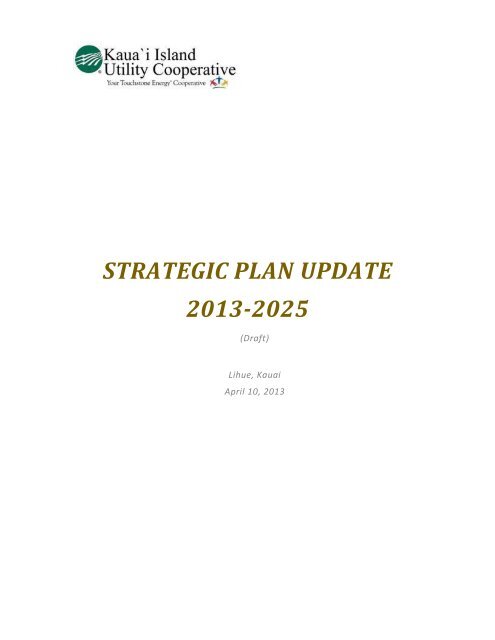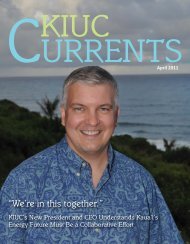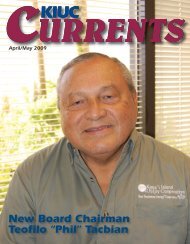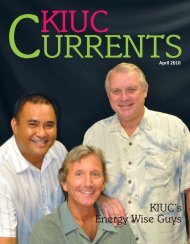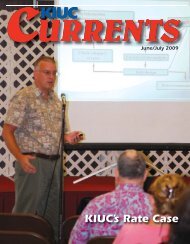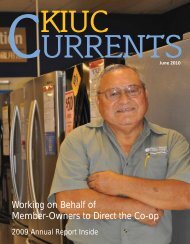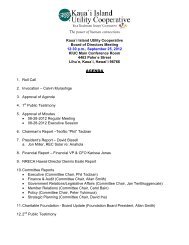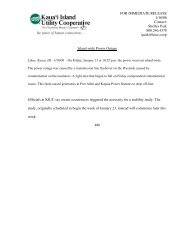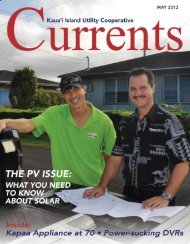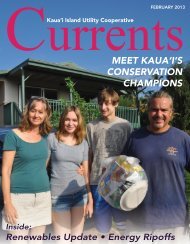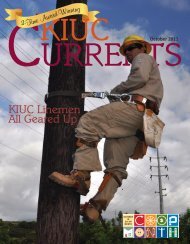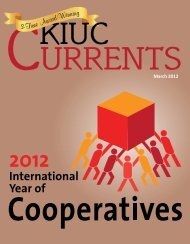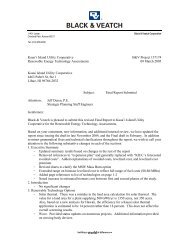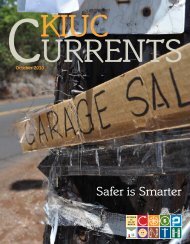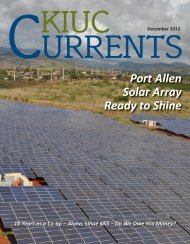draft of the plan - Kauai Island Utility Cooperative
draft of the plan - Kauai Island Utility Cooperative
draft of the plan - Kauai Island Utility Cooperative
Create successful ePaper yourself
Turn your PDF publications into a flip-book with our unique Google optimized e-Paper software.
STRATEGIC PLAN UPDATE<br />
2013-2025<br />
(Draft)<br />
Lihue, <strong>Kauai</strong><br />
April 10, 2013
THE STRATEGIC CONTEXT<br />
The isolation <strong>of</strong> Kauaʻi and its dependence on imported oil was never more apparent as <strong>the</strong> global<br />
economic recession took hold in late 2007. This dependence exposed <strong>the</strong> Kauaʻi <strong>Island</strong> <strong>Utility</strong><br />
<strong>Cooperative</strong> (KIUC) and its members to a record surge in <strong>the</strong> price <strong>of</strong> oil at <strong>the</strong> same time <strong>the</strong> economic<br />
free-fall battered <strong>the</strong> budgets <strong>of</strong> island businesses and families.<br />
These events brought urgency to <strong>the</strong> mission <strong>of</strong> <strong>the</strong> KIUC board <strong>of</strong> directors to decrease reliance on<br />
fossil fuels and to streng<strong>the</strong>n <strong>the</strong> Kauaʻi economy by keeping on-island <strong>the</strong> millions <strong>of</strong> dollars paid<br />
annually for foreign oil.<br />
In 2008, <strong>the</strong> board <strong>of</strong> directors adopted an ambitious goal that would be embedded within nearly every<br />
aspect <strong>of</strong> its strategic <strong>plan</strong>ning. That goal is to use renewable resources to generate at least 50 percent<br />
<strong>of</strong> Kauaʻi’s energy by 2023.<br />
This goal exceeds <strong>the</strong> requirements established by Act 234, <strong>the</strong> 2007 law establishing <strong>the</strong> framework to<br />
reduce greenhouse gas emissions emitted in 2020 to <strong>the</strong> 1990 emission level. It also surpasses <strong>the</strong><br />
requirements set by Act 73 in 2010, <strong>the</strong> Hawaiʻi Clean Energy Initiative (HCEI), which calls for 70 percent<br />
clean energy by 2030, with 40 percent <strong>of</strong> that amount coming from renewable sources.<br />
KIUC is making rapid progress toward its goal, with renewables accounting for 15 percent <strong>of</strong> sales today,<br />
up from 5 percent in 2008. By 2015, renewable generation is projected to be at 42 percent, with a mix <strong>of</strong><br />
solar, biomass and hydropower on line.<br />
Having proven that it has <strong>the</strong> will and <strong>the</strong> expertise to develop utility-scale renewable energy projects,<br />
<strong>the</strong> challenge for KIUC moving forward is to efficiently incorporate renewables into <strong>the</strong> grid and onto its<br />
balance sheet.<br />
Among <strong>the</strong> unanticipated changes since <strong>the</strong> strategic <strong>plan</strong> was last revised in December 2009 is <strong>the</strong><br />
boom in commercial and residential photovoltaic installations. Once only an option for <strong>the</strong> wealthy,<br />
generous state and federal tax incentives and plummeting material costs have made PV more<br />
affordable. By <strong>the</strong> end <strong>of</strong> 2012, more than 1,200 PV systems had been installed on Kauaʻi, generating<br />
nearly 7 megawatts. In 2013, an additional 9 megawatts are expected to come on line.<br />
These PV systems only generate during a few hours <strong>of</strong> <strong>the</strong> day, contributing little or nothing to <strong>the</strong> grid<br />
<strong>the</strong> rest <strong>of</strong> <strong>the</strong> time. The management <strong>of</strong> this intermittent resource requires engineering expertise and a<br />
robust grid, <strong>the</strong> cost <strong>of</strong> which is substantial.<br />
This rapid expansion <strong>of</strong> PV is not only eroding KIUC’s ability to recover fixed costs, but has <strong>the</strong> potential<br />
to exceed load demand, forcing KIUC to consider actions including curtailment, essentially shutting <strong>of</strong>f<br />
PV-generated electricity before it comes into <strong>the</strong> grid.<br />
2
This is not only a technological challenge but a financial one that must be addressed soon through rate<br />
redesign that recognizes <strong>the</strong> changing nature <strong>of</strong> electric utilities and ensures that <strong>the</strong> costs <strong>of</strong> running<br />
<strong>the</strong> utility are fairly allocated amongst members.<br />
Since <strong>the</strong> strategic <strong>plan</strong> was last updated, KIUC has also adjusted its forecasts <strong>of</strong> load growth as well as<br />
its assumptions about how <strong>the</strong> economic revival will impact sales. It is no longer a given that a robust<br />
tourism economy will generate increased demand, especially as large hotel customers turn to PV and<br />
cogeneration.<br />
While Kauaʻi experienced a record year in tourism in 2012, up 7.3 percent from 2011 to 1.08 million<br />
visitors, electricity sales were essentially flat. Sales are expected to stay flat for <strong>the</strong> next several years<br />
with slight increases seen only toward <strong>the</strong> end <strong>of</strong> <strong>the</strong> decade.<br />
Our members are reducing <strong>the</strong>ir energy consumption. Average residential use has fallen 10 percent<br />
since 2007 to about 465 kilowatt hours a month, <strong>the</strong> lowest <strong>of</strong> any Hawaiʻi utility. The introduction <strong>of</strong><br />
new technologies will enable members to monitor <strong>the</strong>ir consumption on a nearly real-time basis,<br />
potentially leading to fur<strong>the</strong>r conservation.<br />
The latest member survey in 2012 revealed a hardening <strong>of</strong> attitudes toward <strong>the</strong> cooperative, with more<br />
members moving to <strong>the</strong> extremes <strong>of</strong> total satisfaction or total dissatisfaction. Fewer are left in <strong>the</strong><br />
middle.<br />
Concern over rates continued to be a key driver <strong>of</strong> satisfaction and 19 percent said <strong>the</strong>ir average bill was<br />
over $300 a month, up 10 points from <strong>the</strong> previous survey in 2009.<br />
As more renewables come on line, <strong>the</strong>re is a clear expectation by members that <strong>the</strong>ir bills will go down.<br />
That desire is shared by <strong>the</strong> board <strong>of</strong> directors and staff members, who are committed to aggressive cost<br />
controls and intelligent deployment <strong>of</strong> <strong>the</strong> co-op’s resources. Effective education and consistent<br />
communication are imperative in this area.<br />
An adequate supply <strong>of</strong> energy would have no meaning without a means to reliably deliver that energy to<br />
KIUC’s members and customers. The shift to local, sustainable sources <strong>of</strong> energy also affects KIUC’s<br />
transmission and distribution infrastructure. This network must be maintained and upgraded to ensure<br />
that its high standards for safety and reliability continue to be met.<br />
This Strategic Plan is an update and expansion <strong>of</strong> <strong>the</strong> Strategic Plan 2008-2023, which was last updated<br />
in December 2009. The goal remains <strong>the</strong> same: to faithfully serve KIUC’s members with reliable,<br />
reasonably priced electricity and to improve <strong>the</strong> quality <strong>of</strong> <strong>the</strong>ir lives.<br />
This <strong>plan</strong> identifies <strong>the</strong> key issues KIUC will face in <strong>the</strong> next five years and provides a common<br />
framework for <strong>the</strong> strategic direction <strong>of</strong> KIUC now and in <strong>the</strong> future.<br />
3
KEY ISSUES<br />
KIUC Board members and key staff (see Attachment C) have identified <strong>the</strong> issues that will need to be<br />
addressed during <strong>the</strong> next five years, 2013-2018:<br />
Continue to build upon KIUC’s strong record <strong>of</strong> safety<br />
Reduce members’ costs<br />
Enhance members’ satisfaction<br />
Maintain reliability<br />
Ensure <strong>the</strong> fairness <strong>of</strong> <strong>the</strong> rate structure<br />
Continue implementing sustainable and diverse energy solutions<br />
Improve organizational/employee development<br />
The Strategic Plan deals with <strong>the</strong>se key issues and is described in more detail in <strong>the</strong> following sections.<br />
4
VISION, MISSION, AND CULTURE<br />
Vision<br />
Improve <strong>the</strong> quality <strong>of</strong> life for KIUC’s members and Kaua’i.<br />
Mission<br />
To be an energy solutions leader by:<br />
Safely providing reliable power that is fairly and competitively priced;<br />
Practicing conservation and efficient use <strong>of</strong> energy resources;<br />
Increasing sustainable power supply and environmental stewardship.<br />
Statement<br />
Empowering Kauaʻi<br />
Culture<br />
The culture is shaped by several elements, all critical to its success. KIUC embraces <strong>the</strong> seven principles<br />
<strong>of</strong> a cooperative as shown in Attachment A. Ho`oka`ana Waiwai is an agreed upon set <strong>of</strong> Hawaiianbased<br />
values that provides a guiding statement and is shown in Attachment B.<br />
Core Values<br />
Core values that are to be tied to work performance, practiced daily, promoted without compromise,<br />
and communicated through actions are:<br />
Respect (Kupono): treating everyone with fairness, integrity, and honesty<br />
Teamwork (Laulima): looking out for each o<strong>the</strong>r and working toge<strong>the</strong>r as one team toward<br />
common goals<br />
Excellence (Ho`okela): striving to provide <strong>the</strong> best pr<strong>of</strong>essional service to our members by<br />
producing high quality work and excelling in everything one does<br />
Responsibility (Kuleana): practicing stewardship and <strong>the</strong> privilege <strong>of</strong> doing <strong>the</strong> right thing for<br />
our members in a responsive manner<br />
5
STRATEGIC GOALS AND ACTIONS<br />
Strategic Goal A: Implement energy solutions, including diversification <strong>of</strong><br />
power supply and reduced dependency on fossil fuel<br />
Actions<br />
A1: Achieve 50% renewables by 2023<br />
A2: Enhance existing energy efficiency programs and incentives<br />
A3: Collaborate with o<strong>the</strong>rs on energy efficient solutions<br />
A4: Efficiently manage end-user generation<br />
A5: Optimize smart grid<br />
A6: Manage local fuel sources, self-sufficiency, and storage<br />
Strategic Goal B: Enhance member satisfaction and support<br />
Actions<br />
B1: Work diligently to help reduce members’ utility bills.<br />
B2: Utilize technology to improve <strong>the</strong> quality <strong>of</strong> member engagement.<br />
B3: Maintain a reliability standard better than <strong>the</strong> average <strong>of</strong> Hawaiʻi utilities while controlling costs.<br />
B4: Keep members informed.<br />
Strategic Goal C: Improve employee development and workforce excellence<br />
Actions<br />
C1: Improve safety culture.<br />
C2: Help employees achieve pr<strong>of</strong>essional excellence<br />
C3: Embrace diversity, acknowledge its power and integrate training that builds a respectful and<br />
collaborative workforce<br />
C4: Develop employment opportunities for Kauaʻi residents.<br />
C5: Maintain effective Board/Staff team by streng<strong>the</strong>ning trust and confidence among directors,<br />
staff, and employees.<br />
Strategic Goal D: Ensure Financial Stability<br />
Actions<br />
D1: Ensure fair and competitive rates<br />
D2: Maintain and improve lender relations<br />
D3: Keep costs at or below <strong>the</strong> rate <strong>of</strong> inflation<br />
D4: Utilize effective risk management tools to reduce <strong>the</strong> cooperative’s financial exposure.<br />
6
IMPLEMENTATION<br />
The Strategic Plan goals and actions will be implemented effectively upon approval by <strong>the</strong> KIUC Board <strong>of</strong><br />
Directors according to <strong>the</strong> following guidelines:<br />
1. The Strategic Plan will be implemented by an Agenda for Action (AFA) that will cover a two-year<br />
increment period. The KIUC leadership team will review <strong>the</strong> Strategic Plan every year and develop a<br />
“rolling” Agenda for Action that covers <strong>the</strong> following two years.<br />
2. The Agenda for Action will be developed by <strong>the</strong> KIUC Management Team through collaboration with<br />
<strong>the</strong> Board Strategic Planning Committee (BSPC). Toge<strong>the</strong>r, <strong>the</strong>y will identify <strong>the</strong> outcomes for each<br />
action and <strong>the</strong> time line. Management will be responsible for carrying out <strong>the</strong> specific actions, and<br />
periodically, will provide a status report <strong>of</strong> progress and achievement <strong>of</strong> each actions and outcomes.<br />
The BSPC will have oversight <strong>of</strong> <strong>the</strong> AFA to ensure that <strong>the</strong> Strategic Plan is implemented in a timely<br />
manner.<br />
3. The Strategic Plan will be reviewed monthly by <strong>the</strong> responsible units/individuals to keep on target or<br />
to make adjustments to <strong>the</strong> Plan.<br />
4. The KIUC CEO will make quarterly and annual reports to <strong>the</strong> KIUC Board <strong>of</strong> Directors through <strong>the</strong><br />
BSPC.<br />
5. The BSPC will be responsible for initiating <strong>the</strong> development <strong>of</strong> <strong>the</strong> next Strategic Plan at an<br />
appropriate time.<br />
The Strategic Plan sets <strong>the</strong> overall direction <strong>of</strong> KIUC and intends to benefit members, directors, and all<br />
employees <strong>of</strong> KIUC.<br />
7
Seven <strong>Cooperative</strong> Principles<br />
Why <strong>Cooperative</strong>s Are Special. All cooperative businesses adhere to <strong>the</strong>se seven guiding<br />
principles:<br />
1. Voluntary and Open Membership<br />
8<br />
Attachment A<br />
<strong>Cooperative</strong>s are voluntary organizations, open to all persons able to use <strong>the</strong>ir services and willing<br />
to accept <strong>the</strong> responsibilities <strong>of</strong> membership, without gender, social, racial, political, or religious<br />
discrimination.<br />
2. Democratic Member Control<br />
<strong>Cooperative</strong>s are democratic organizations controlled by <strong>the</strong>ir members, who actively participate in<br />
setting policies and making decisions. The elected representatives are accountable to <strong>the</strong><br />
membership. In primary cooperatives, members have equal voting rights (one member, one vote)<br />
and cooperatives at o<strong>the</strong>r levels are organized in a democratic manner.<br />
3. Members' Economic Participation<br />
Members contribute equitably to, and democratically control, <strong>the</strong> capital <strong>of</strong> <strong>the</strong>ir cooperative. At<br />
least part <strong>of</strong> that capital is usually <strong>the</strong> common property <strong>of</strong> <strong>the</strong> cooperative. Members usually<br />
receive limited compensation, if any, on capital subscribed as a condition <strong>of</strong> membership.<br />
Members allocate surpluses for any or all <strong>of</strong> <strong>the</strong> following purposes: developing <strong>the</strong> cooperative,<br />
possibly by setting up reserves, part <strong>of</strong> which at least would be indivisible; benefiting members in<br />
proportion to <strong>the</strong>ir transactions with <strong>the</strong> cooperative; and supporting o<strong>the</strong>r activities approved by<br />
<strong>the</strong> membership.<br />
4. Autonomy and Independence<br />
<strong>Cooperative</strong>s are autonomous, self-help organizations controlled by <strong>the</strong>ir members. If <strong>the</strong>y enter<br />
into agreements with o<strong>the</strong>r organizations, including governments, or raise capital from external<br />
sources, <strong>the</strong>y do so on terms that ensure democratic control by <strong>the</strong>ir members and maintain <strong>the</strong>ir<br />
cooperative autonomy.<br />
5. Education, Training, and Information<br />
<strong>Cooperative</strong>s provide education and training for <strong>the</strong>ir members, elected representatives, managers,<br />
and employees so <strong>the</strong>y can contribute effectively to <strong>the</strong> development <strong>of</strong> <strong>the</strong>ir cooperatives. They
inform <strong>the</strong> general public, particularly young people and opinion leaders, about <strong>the</strong> nature and<br />
benefits <strong>of</strong> cooperation.<br />
6. Cooperation Among <strong>Cooperative</strong>s<br />
<strong>Cooperative</strong>s serve <strong>the</strong>ir members most effectively and streng<strong>the</strong>n <strong>the</strong> cooperative movement by<br />
working toge<strong>the</strong>r through local, national, regional, and international structures.<br />
7. Concern for Community<br />
While focusing on member needs, cooperatives work for <strong>the</strong> sustainable development <strong>of</strong> <strong>the</strong>ir<br />
communities through policies accepted by <strong>the</strong>ir members.<br />
9
Ho`oka`ana Waiwai (Shared Values)<br />
10<br />
Attachment B<br />
Preamble: We, as a company and as individuals, accept <strong>the</strong>se shared values as a guide to making<br />
ethical decisions and promoting harmony with KIUC and our island community.<br />
Aloha<br />
We welcome our members with respect, sincerity, and graciousness.<br />
I will seek to be trustworthy, to share, respect and be kind to my KIUC bro<strong>the</strong>rs and sisters, and<br />
members.<br />
Ho`ohiki<br />
We are committed to keeping our promises to each o<strong>the</strong>r and our community.<br />
I am accountable for what I say and do.<br />
Ho`okela<br />
We strive to provide <strong>the</strong> best service to our members.<br />
I will contribute my best to attain <strong>the</strong> highest level <strong>of</strong> achievement.<br />
Ho`omau<br />
We will persevere in our journey toge<strong>the</strong>r towards member satisfaction.<br />
I will not waiver from <strong>the</strong> path.<br />
Kuleana<br />
We accept our responsibility to our island community as a privilege.<br />
To do <strong>the</strong> right thing is a privilege I accept.<br />
Kupono<br />
We will treat members with fairness, integrity and honesty.<br />
I am committed to treat o<strong>the</strong>rs <strong>the</strong> way I like to be treated.<br />
Laulima<br />
We will work toge<strong>the</strong>r toward common goals where one person’s success is everyone’s success.<br />
I will combine my best efforts with o<strong>the</strong>rs.<br />
`Ohana<br />
Community and coworkers, everyone is part <strong>of</strong> <strong>the</strong> KIUC family.
Attachment C<br />
KIUC Leadership Team That Updated Strategic Plan 2013-2025<br />
2013 Board <strong>of</strong> Directors<br />
Carol Bain<br />
Karen Baldwin<br />
David Iha (Secretary)<br />
Patrick Gegen<br />
Calvin Murashige<br />
Allan A. Smith (Chairman)<br />
Te<strong>of</strong>ilo “Phil” Tacbian (Chairman Emeritus)<br />
Jan TenBruggencate (Vice Chairman)<br />
Peter Yukimura (Treasurer)<br />
KIUC Management and Staff<br />
David Bissell, President and Chief Executive Officer<br />
Karissa Jonas, Financial Vice President and Chief Financial Officer<br />
Kathleen “Pua” Chin, Executive Administrator to <strong>the</strong> Board and CEO<br />
Tim Blume, Regulatory Affairs Manager<br />
Jim Kelly, Communications Manager<br />
Carey Koide, Transmission and Distribution Manager<br />
Laurel Loo, General Counsel<br />
Barbara Nagamine, Member Services Manager<br />
Edwin Nakaya, Key Accounts Executive<br />
Brad Rockwell, Power Supply Manager<br />
Lisa Ubay, Human Resources Manager<br />
Michael Yamane, Chief <strong>of</strong> Operations


